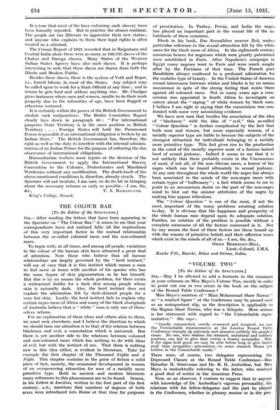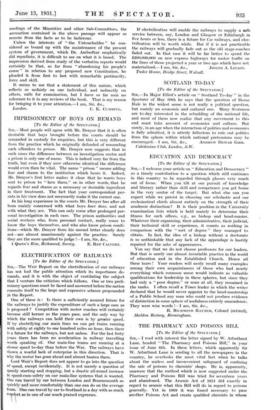"VOLUME TWO "
[To the Editor of the SPECTATOR.] SIR,—May I be allowed to add a footnote to the comment in your columns on Miss Mayo's Volume Two, merely in order
to point out one or two errors in the book on the subject of the Round Table Conference ?
Miss Mayo's mention of " Mien Mohammad Shaw Nawaz " as " a marked figure " at the Conference may be passed over as an unimportant slip, as the description is applicable to the Begum Shaw Nawaz, who was a delegate. More serious is her statement with regard to " the Untouchable repre- sentative." She says :
" Cruelly outmatched, cruelly overawed and tempted, we saw the Untouchable representative at the London Round Table Conference crumple up piteously and abandon publicly his people's cause. No one, who realizes his strained, unnatural and solitary position, can fail to give that victim a hearty sympathy. But, if the signs hold good, we may be able before long to give better stuff than sympathy—admiration—to some staunch Moses yet hidden in the Untouchable ranks."
There were, of course, two delegates representing the Depressed Classes at the Round Table Conference—Rao Bahadur R. Srinivasan and Dr. B. R. Ambedkar, but Miss Mayo is undoubtedly referring to the latter, who received a good deal of notice in the American Press.
Now, as an observer, I venture to suggest that to anyone
with knowledge of Dr. Ambedkar's vigorous personality, his relations with his fellow-delegates and the part he played in the Conference, whether in plenary session or in the pro-
ceedings of the Minorities and other Sub-Committees, the accusation contained in the above passage will appear so remote from the facts as to be ludicrous.
Unless the interests of " the Untouchables " be con- sidered as bound up with the maintenance of the present system of government, which Dr. Ambedkar emphatically did repudiate, it is difficult to see on what it is based. The impression derived from study of the verbatim reports would certainly be that, so far from " abandoning his people's cause " in relation to any proposed new Constitution, he pleaded it from first to last with remarkable pertinacity, force and skill.
It' seems to me that a statement of this nature, which reflects so unfairly on one individual, and indirectly on others, calls for examination, but I have so far seen no reference to it in any reviews of the book. That is my reason for bringing it to your attention.—I am, Sir, &c.,







































 Previous page
Previous page